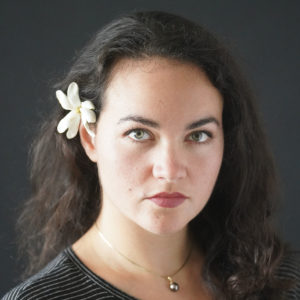SLIDESHOW: Helping The Homeless Along River Street
Maintaining hygiene and preventing skin, wound and respiratory infections are more difficult for the homeless during the COVID-19 pandemic.

The medical team from the Hawaii Health and Harm Reduction Center is well known among the people who congregate around River Street weekday mornings in Honolulu.
Twice a week the nurses tend to wounds, administer flu shots, and order medical prescriptions for Honolulu’s homeless. Since April, the mobile has assisted nearly 200 people 600 times.聽 
Christina Wang, who holds a doctorate degree in nursing, leads the clinic with a cheery and non-judgmental demeanor. She and her team are approachable and equipped to tend to the varying needs of patients right on the sidewalk.
Maintaining hygiene and preventing both skin and respiratory infections are among her patients’ greatest challenges. Preventing those issues is even more difficult during the pandemic.
“A lot of things for basic human needs got turned off,” she said. “Places where people go to get showers and clothing got completely disrupted.”
Wang and her team use ongoing wound care services as a way to build trust with the people who live outdoors and connect them to other services. Many of them have mental illness or suffer from the effects of substance use.
“It helps us engage with them and meets a medical need that is so needed on the street,” said Courtny Tanigawa, a nurse practitioner. “It keeps them out of the emergency room as much as we can.”
Preventing infections is top of mind, especially among seniors. The most requested items from the H3RC team are bandaids, soap, lotion and medicine. The COVID-19 pandemic has only added to their existing worries about maintaining their health.
The closing and reopening of public bathrooms has been the most frustrating, said Danny Honea, 71, who lives in a shelter he made on the North Kukui Street sidewalk.
“The government shutting down toilets and fresh water I think would bring more disease,” he said.
The medical team says referring people to medical and social services is more difficult because treatment and hygiene centers have shifted hours and occupancy rules to prevent COVID-19 transmission.
“That’s been the hard thing because when people are ready (for help), they’re ready,” Tanigawa said.


